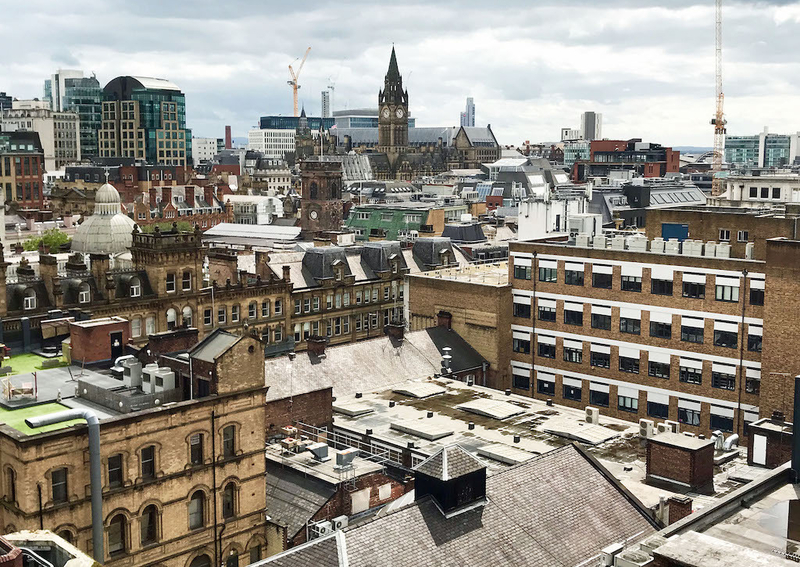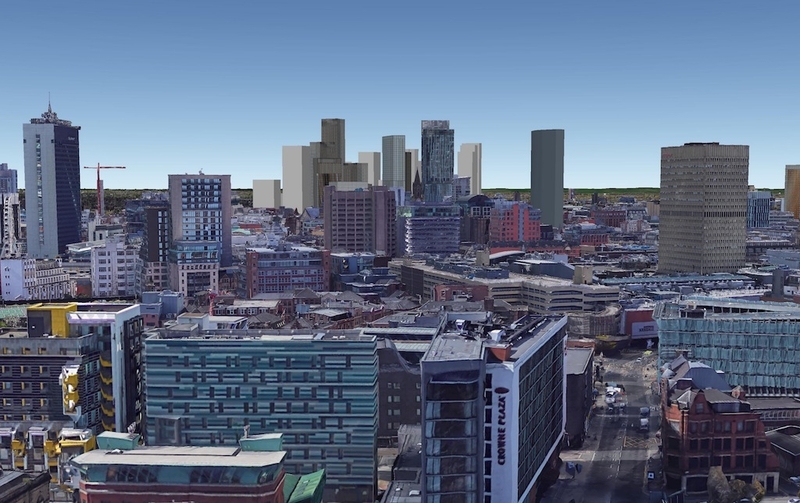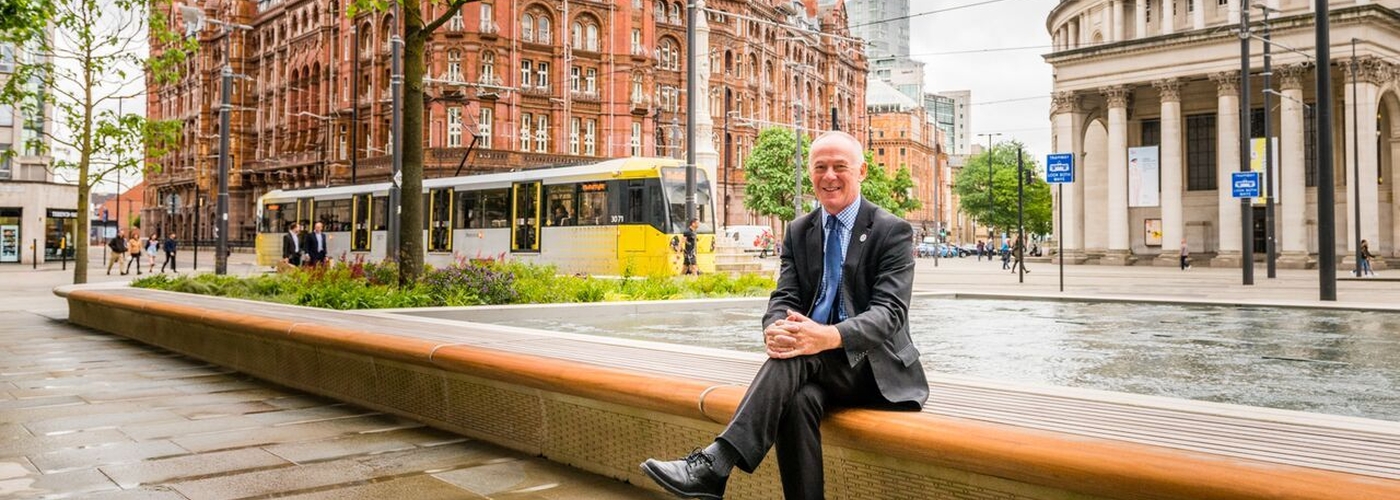Councillor Blundell contemplates Richard Leese’s importance in Manchester’s resurgence as Britain's most exciting city
There is an important distinction to make between what Sir Richard Leese’s job description was and what he achieved. Richard hasn’t just been the Leader of Manchester City Council, he has been the Leader of the city at large, and to this effect will leave a gaping hole in the social and political fabric of the city. Like or loathe him, he has been the most significant figure in British local government since World War Two and it is unlikely there will be another one like him for some time.
I was once sat on a train with Richard on the way back from London. I asked if he thought Manchester was Britain’s second city, to which he replied, to my astonishment, no. In response to my bemused face he said “who wants to be second?” He may not be a native Mancunian but his confidence in our city is on par and it is this self confidence that he has renewed in the city’s people.
Richard has ultimately been the architect of the Greater Manchester project at a political level
The urban fabric of Manchester provides a residual memory of the world’s first industrial metropolis and provides a blueprint for a world leading city. Instead of building on our built environment’s shape and form, successive governments opted to strip the soul out of Manchester by scattering housing development and employment sites across the region, outside of the core. Under Richard’s tenure the city centre has boomed and we can’t assume this would have happened anyway given so many before him had driven through policies that sought to achieve the polar opposite.

His impact has not only been on the city centre. Under his leadership, Greater Manchester has undoubtedly become one of the most dynamic city regions in Europe and has developed a national and global reputation for being a fast-paced and once more burgeoning city. At world conferences (like MIPIM) he is asked to speak at other country’s events and it is seen as prestigious to get him to do so. But despite all this his biggest achievement (which will go down in history books) isn’t what people necessarily think of him for today, which is the growth of the city centre.
Lots of people like to claim they were the architect of devolution, and there is no doubt the likes of Sir Howard Bernstein played a significant role in the negotiations with Osborne, but the fact is that if Greater Manchester had remained politically fractured none of the events that had led to the (relatively) recent boom would have occurred. Richard’s political covenant strength at a regional level provided a platform for the city’s resources to be corralled behind a vision whereby it could be begin to flourish.

This has been the importance of Richard. He has redefined the city’s borders to encompass all things Mancunian and has diminished the walls of the state to make it permeable to business, and the city’s institutions, to ensure the city’s prosperity.
As Leader of the City, and Deputy Mayor of Greater Manchester, he has built a city region under brand Manchester that has not been possible elsewhere outside of London. Mayor Burnham fulfils the role required to unify the city’s people but it was Richard who provided the political leadership to develop a governance structure and track record whereby this could happen in the first place. In the statements published by the Council on the announcement of his leaving date he pushed his “Our Manchester” strategy, a stance that articulates in a council policy his approach to service delivery and regeneration that has become embodied in the way Manchester does things, the city that allegedly ‘does things differently’.
A standing ovation for @SirRichardLeese at tonight’s Manchester Labour Group upon the announcement of his retirement after 25 years of service to our city. Tributes led by @patkarney. Thank you so much for everything Richard, it’s an honour to call you a friend. 🌹🐝 pic.twitter.com/EIVcJRZXzW
— Thomas F. Robinson (@TomFredRob) September 7, 2021
My political hero is Herbert Morrison, best known for being Winston Churchill’s Home Secretary in the second world war, because of his work as Leader of London County Council (1934-1940). The most notable thing Herbert achieved was the establishment of the London Passenger Transport Board (known as ‘London Transport’ and now Transport for London) which brought together the city’s transport infrastructure under a single structure. He also was essential in developing a green belt (long before the post-war legislation) around London to negate sprawl and he sought to bring forward legislation to introduce land value taxes to ensure the development of derelict land. Herbert’s work in local government has been far longer lasting than his work in national government because the fact is local government is far more important.

Richard once told me: “London’s structures will never mature into a credible form of local governance because of the division between the GLA and its boroughs, despite the fact it has clearly been adopted by other places”. As a dull as some might find it, the city state government structure he leaves behind is arguably the most robust form of city governance there is. The veritable boon it has provided to the city is reflected in the strength of our economy and our status in the world.
Richard has attracted criticism but politicians who are universally liked have never achieved anything. Richard achieved an enormous amount so isn’t universally liked but criticism always comes from hard left extremists. It is hard to quantify the impact of one man but what is certain is his imprint on local government will reverberate around the walls of every town hall in Britain for many decades to come.
Councillor John Blundell is a master of economics and studied at the University of Manchester. He also attended Birkbeck College. He was elected to Rochdale Metropolitan Borough Council at the age of 20 and has been the Cabinet Member for Regeneration for several years. He is a Senior Economist at a well-known international firm and wants to use his professional skills to contribute to the debate on Greater Manchester's economy and its politics.
Timeline - Sir Richard Leese
1984 – first elected to City Council
1990-96 - Deputy Leader
May 1996 - Becomes Leader
June 1996 - IRA Manchester city centre bomb
1996 - Manchester Millennium Limited established to oversee the transformation of the city centre
1999 - New East Manchester urban regeneration company established
2002 – Manchester hosts the Commonwealth Games, at the time the largest multi-sports event ever hosted in the UK and the catalyst to the wider regeneration of East Manchester and unparalleled investment in sports and leisure facilities around the Etihad Campus.
2006 – Knighted for services to local government
2007 – Manchester International Festival established
2011 – Greater Manchester Combined Authority established, with Sir Richard as vice chair Nov 2014 – Signatory to the Greater Manchester devolution agreement with central government, which gives greater powers to the Combined Authority working together with a directly-elected GM Mayor.
Feb 2015 – Signatory to the Greater Manchester Health and Devolution Memorandum of Understanding outlining plans to integrate health and social care in GM and devolve the NHS budget to the region.
April 2016 – The MoU agreement comes into force
May 2017 – Appointed as Deputy Mayor of Greater Manchester
2017 – Manchester Arena terror attack
2018 – Huge Northern Gateway initiative announced, the biggest regeneration scheme in the city since East Manchester
March 2020 – Takes over as GMCA portfolio holder for health and care and as chair of Greater Manchester Health and Social Care Partnership during the pandemic
















